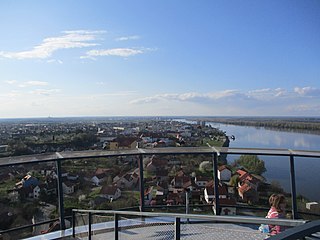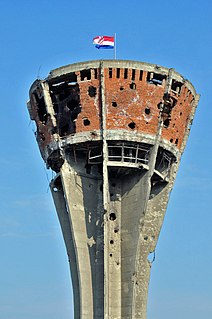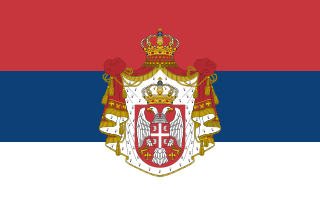
The Balkans, also known as the Balkan Peninsula, is a geographic area in southeastern Europe with various geographical and historical definitions. The region takes its name from the Balkan Mountains that stretch throughout the whole of Bulgaria. The Balkan Peninsula is bordered by the Adriatic Sea in the northwest, the Ionian Sea in the southwest, the Aegean Sea in the south, the Turkish Straits in the east, and the Black Sea in the northeast. The northern border of the peninsula is variously defined. The highest point of the Balkans is Mount Musala, 2,925 metres (9,596 ft), in the Rila mountain range, Bulgaria.

Vukovar is a city in Croatia, in the eastern region of Slavonia. It contains Croatia's largest river port, located at the confluence of the Vuka and the Danube. Vukovar is the seat of Vukovar-Syrmia County and the second largest city in the county after Vinkovci. The city's registered population was 22,616 in the 2021 census, with a total of 23,536 in the municipality.

The term Greater Serbia or Great Serbia describes the Serbian nationalist and irredentist ideology of the creation of a Serb state which would incorporate all regions of traditional significance to Serbs, a South Slavic ethnic group, including regions outside modern-day Serbia that are partly populated by Serbs. The initial movement's main ideology (Pan-Serbism) was to unite all Serbs into one state, claiming, depending on the version, different areas of many surrounding countries.

The Republic of Serbian Krajina or Serb Republic of Krajina, known as the Serbian Krajina or simply Krajina, was a self-proclaimed Serb proto-state, a territory within the newly independent Republic of Croatia, which it defied, and which was active during the Croatian War of Independence (1991–95). It was not recognized internationally. The name Krajina ("Frontier") was adopted from the historical Military Frontier of the Habsburg monarchy and Austria-Hungary, which had a substantial Serb population and existed up to the late 19th century. The RSK government waged a war for ethnic Serb independence from Croatia and unification with FR Yugoslavia and Republika Srpska.

Politika is a Serbian daily newspaper, published in Belgrade. Founded in 1904 by Vladislav F. Ribnikar, it is the oldest daily newspaper still in circulation in the Balkans.

The Battle of Vukovar was an 87-day siege of Vukovar in eastern Croatia by the Yugoslav People's Army (JNA), supported by various paramilitary forces from Serbia, between August and November 1991. Before the Croatian War of Independence the Baroque town was a prosperous, mixed community of Croats, Serbs and other ethnic groups. As Yugoslavia began to break up, Serbia's President Slobodan Milošević and Croatia's President Franjo Tuđman began pursuing nationalist politics. In 1990, an armed insurrection was started by Croatian Serb militias, supported by the Serbian government and paramilitary groups, who seized control of Serb-populated areas of Croatia. The JNA began to intervene in favour of the rebellion, and conflict broke out in the eastern Croatian region of Slavonia in May 1991. In August, the JNA launched a full-scale attack against Croatian-held territory in eastern Slavonia, including Vukovar.

The Kingdom of Serbia was a country located in the Balkans which was created when the ruler of the Principality of Serbia, Milan I, was proclaimed king in 1882. Since 1817, the Principality was ruled by the Obrenović dynasty. The Principality, under the suzerainty of the Ottoman Empire, de facto achieved full independence when the last Ottoman troops left Belgrade in 1867. The Congress of Berlin in 1878 recognized the formal independence of the Principality of Serbia, and in its composition Nišava, Pirot, Toplica and Vranje districts entered the South part of Serbia.

Srpski Krstur is a village located in Serbia, in the Novi Kneževac municipality of the North Banat District, in the Autonomous Province of Vojvodina. The village has a Serb ethnic majority (69.81%) with a present Romani (13.58%) and Hungarian minority (9.38%). It has a population of 1,620 people.
The Battle of Borovo Selo of 2 May 1991, known in Croatia as the Borovo Selo massacre and in Serbia as the Borovo Selo incident, was one of the first armed clashes in the conflict which became known as the Croatian War of Independence. The clash was precipitated by months of rising ethnic tensions, violence, and armed combat in Pakrac and at the Plitvice Lakes in March. The immediate cause for the confrontation in the heavily ethnic Serb village of Borovo Selo, just north of Vukovar, was a failed attempt to replace the Yugoslav flag in the village with the flag of Croatia. The unauthorised effort by four Croatian policemen resulted in the capture of two by a Croatian Serb militia in the village. To retrieve the captives, the Croatian authorities deployed additional police, who drove into an ambush. Twelve Croatian policemen and one Serb paramilitary were killed before the Yugoslav People's Army (JNA) intervened and put an end to the clashes.
The Vukovar massacre, also known as the Vukovar hospital massacre or the Ovčara massacre, was the killing of Croatian prisoners of war and civilians by Serb paramilitaries, to whom they had been turned over by the Yugoslav People's Army (JNA), at the Ovčara farm southeast of Vukovar on 20 November 1991, during the Croatian War of Independence. The massacre occurred shortly after Vukovar's capture by the JNA, Territorial Defence (TO), and paramilitaries from neighbouring Serbia. It was the largest massacre of the Croatian War of Independence.

Independent Croatia and Serbia established diplomatic relations on 9 September 1996, following the end of the Croatian War of Independence. From 1918 to 1991, both countries were part of Yugoslavia. They now share 241 kilometers of common border. According to the 2011 Croatian census, there were 186,633 Serbs living in Croatia. According to the 2011 Serbian census, there were 57,900 Croats living in Serbia. Smaller lasting disputes include border disputes over the Island of Šarengrad and the Island of Vukovar. Serbian and Croatian are mutually intelligible standardized varieties of the Serbo-Croatian language and are official in Serbia and Croatia respectively.
TeaMp0isoN was a computer security research group consisting of 3 to 5 core members. The group gained notoriety in 2011/2012 for its blackhat hacking activities, which included attacks on the United Nations, NASA, NATO, Facebook, Minecraft Pocket Edition Forums, and several other large corporations and government entities. TeaMp0isoN disbanded in 2012 following the arrests of some of its core members, "TriCk", and "MLT".
Anonymous is a decentralized virtual community. They are commonly referred to as an internet-based collective of hacktivists whose goals, like its organization, are decentralized. Anonymous seeks mass awareness and revolution against what the organization perceives as corrupt entities, while attempting to maintain anonymity. Anonymous has had a hacktivist impact. This is a timeline of activities reported to be carried out by the group.

The Syrian Electronic Army is a group of computer hackers which first surfaced online in 2011 to support the government of Syrian President Bashar al-Assad. Using spamming, website defacement, malware, phishing, and denial-of-service attacks, it has targeted terrorist organizations, political opposition groups, western news outlets, human rights groups and websites that are seemingly neutral to the Syrian conflict. It has also hacked government websites in the Middle East and Europe, as well as US defense contractors. As of 2011 the SEA has been "the first Arab country to have a public Internet Army hosted on its national networks to openly launch cyber attacks on its enemies".

NullCrew was a hacktivist group founded in 2012 that took responsibility for multiple high-profile computer attacks against corporations, educational institutions, and government agencies.

The border between Croatia and Serbia in the area of the Danube is disputed. While Serbia holds the opinion that the thalweg of the Danube valley and the centerline of the river represents the international border between the two countries, Croatia disagrees and claims that the international border lies along the boundaries of the cadastral municipalities located along the river—departing from the course at several points along a 140-kilometre (87 mi) section. The cadastre-based boundary reflects the course of the Danube which existed in the 19th century, before meandering and hydrotechnical engineering works altered its course. The area size of the territory in dispute is reported variously, up to 140 square kilometres.
Croatian Revolution Hackers (CRH) was a black hat hacking group originating in Croatia, known for using DDoS, defacement, and other methods against targeted websites in Croatia and neighboring countries The group was disbanded in 2014. It is believed that CRH was the biggest Croatian hacking group ever.

The Constitution of Croatia in its preamble defines Croatia as a nation state of ethnic Croats, a country of traditionally present communities that the constitution recognizes as national minorities and a country of all its citizens. National minorities explicitly enumerated and recognized in the Constitution are Serbs, Czechs, Slovaks, Italians, Hungarians, Jews, Germans, Austrians, Ukrainians, Rusyns, Bosniaks, Slovenes, Montenegrins, Macedonians, Russians, Bulgarians, Poles, Romani, Romanians, Istro-Romanians ("Vlachs"), Turks and Albanians. Article 12 of the constitution states that the official language in Croatia is Croatian, but also states that in some local governments another language and Cyrillic or some other script can be introduced in official use. Croatia recognises the following languages: Albanian, Bosnian, Bulgarian, Czech, German, Hebrew, Hungarian, Macedonian, Montenegrin, Polish, Romani, Romanian, Russian, Rusyn, Serbian, Slovak, Slovenian, Turkish and Ukrainian.
Vukovar resolution was the document in which Serbs from Vukovar and neighboring communities, at the end of 1939 requested from central Yugoslav government exemption of Vukovar county from the Banovina of Croatia and its annexation to the Danube Banovina or future Banovina of Serbia.












